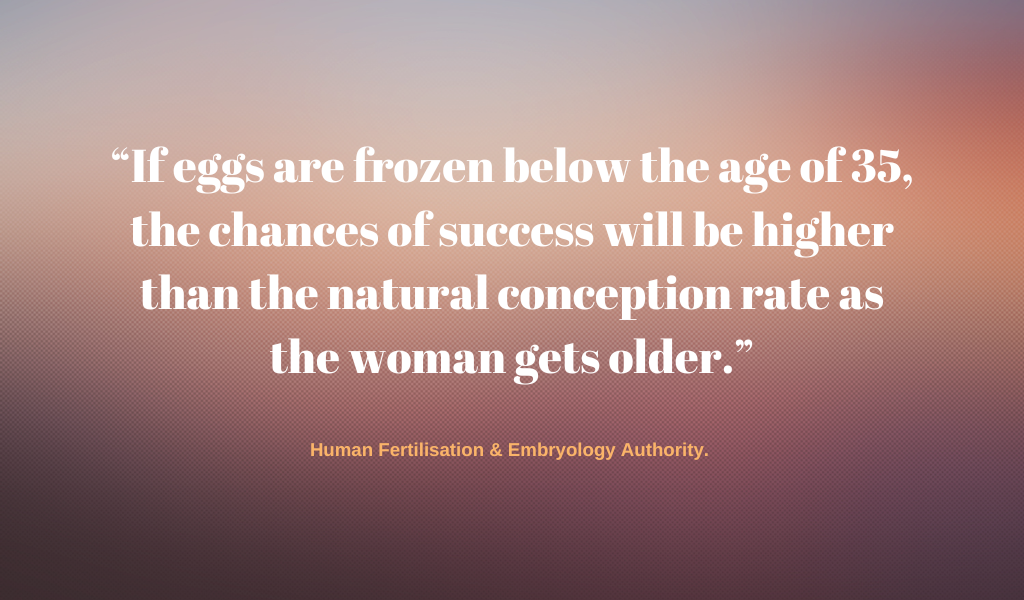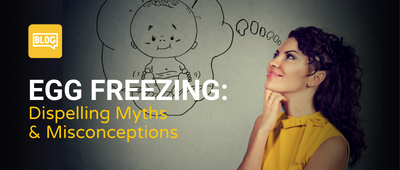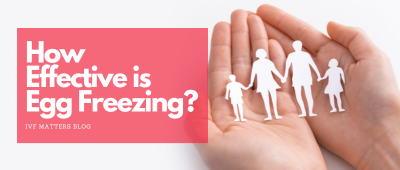More and more women are turning to egg freezing as a safe and effective method of pausing their biological clock until they are ready to start a family.

In this blog post, we’ll not only explain how long you can store your frozen eggs, but we’ll also delve into the new rules and regulations that have recently come into effect governing their storage. Spoiler alert — it’s good news.
Why do people freeze their eggs?
Before we get into the what’s and how's of storing your frozen eggs, let’s take a quick look at why you might want to freeze your eggs in the first place.
If you know that you aren’t ready to start a family; you’d rather focus on your career right now, or you simply haven’t found the right partner yet, these are all perfectly good reasons for wanting to preserve your fertility until a later date.
There are also lots of other reasons why women choose to freeze their eggs. Here are just a few examples:
-
Medical conditions – endometriosis, sickle cell anaemia and lupus can all decrease overall fertility.
-
Treatments – chemotherapy or radiation therapy can permanently affect a woman’s ability to get pregnant.
- Gender identity – transgender individuals often like to preserve their fertility before undergoing hormone therapy.
For any woman who wants to safeguard their chance to start a family when they are ready, egg-freezing treatment can help them achieve their future family planning goals.
How are eggs frozen and stored?
Once you have gone through the egg freezing procedure and the eggs have been retrieved, your mature eggs will be ‘flash frozen’ in a process known as vitrification.
First, the eggs are injected with a special antifreeze-like solution that prevents ice crystals from forming and potentially damaging your egg when it is thawed.
Then, the eggs are rapidly cooled down to -196c before being stored in liquid nitrogen in a carefully controlled storage facility.
Learn more about the end-to-end process involved with egg-freezing treatment at IVF Matters.

How long can frozen eggs be stored in the UK?
As of 1 July 2022, a new law came into effect that changed the rules for how long you can store your eggs, sperm or embryos.
Before this date, you could only store your eggs for ten years unless you had a premature fertility issue. For women with premature fertility issues, you could lawfully store your eggs for up to 55 years.
However, thanks to the recent change in regulations, anyone can now store their eggs, sperm or embryos for 55 years. This is welcome news for women with frozen eggs who no longer have to worry about any additional time constraints if they are still not ready to start their family.
What are the relevant regulations and guidelines?
While The Human Fertilisation Embryology Authority (HFEA) — the UK’s fertility regulatory body — may have extended the maximum storage time for eggs to 55 years, it’s important to note that there are strict guidelines that accompany the new rule.
For instance, the HFEA state that you must renew consent for your eggs to be stored every ten years.
Your clinic will contact you with the relevant consent forms to sign, so they must have up-to-date contact details. If the clinic cannot contact you in time, your frozen eggs could end up being removed from storage and disposed of.
Can the length of storage affect egg quality?
Your eggs can be stored for as long as you need them to be without affecting their quality.
Using frozen eggs during fertility treatments does not increase the risk of pregnancy complications or birth defects. In fact, many healthy babies have been born from frozen eggs that have been stored for over ten years.
The key factor that affects both your egg quality and likelihood of success is your age at the time of retrieval. As you age, the quality and quantity of your eggs will decrease. This doesn’t affect how long your eggs can be effectively stored, but it does mean that they are more likely to have chromosomal abnormalities.
Older eggs with chromosomal abnormalities can lead to failed fertilisation, miscarriage or birth defects. That’s why freezing your eggs earlier gives you the best chance of having a healthy baby in the future.
Discover more about egg freezing
If you’re ready to take your first steps to preserve your fertility, book a free advisory call with one of IVF Matters’ fertility experts.
We would be more than happy to answer any of your questions or queries, helping walk you through the process and teaching you all about what to expect along the way.
Sources
- https://www.hfea.gov.uk/about-us/news-and-press-releases/2022-news-and-press-releases/new-law-comes-into-force-giving-greater-flexibility-for-fertility-patients/
- https://www.hfea.gov.uk/treatments/fertility-preservation/egg-freezing/
- https://www.hfea.gov.uk/choose-a-clinic/consent-to-treatment-and-storage/






